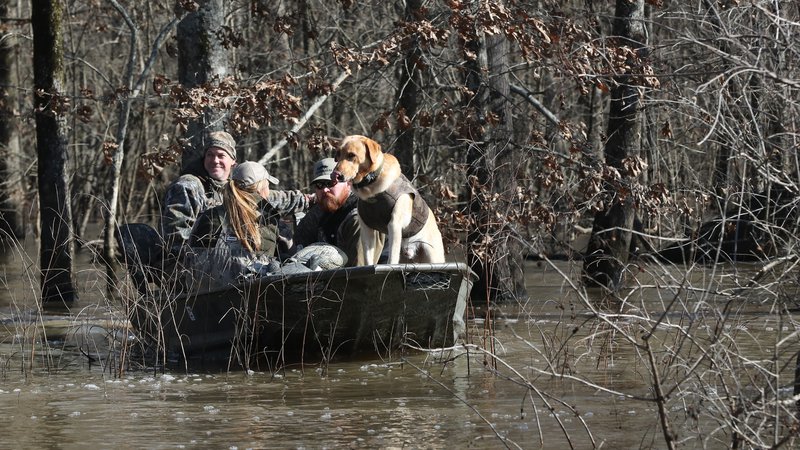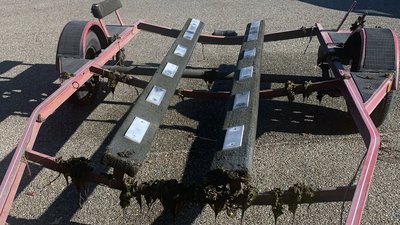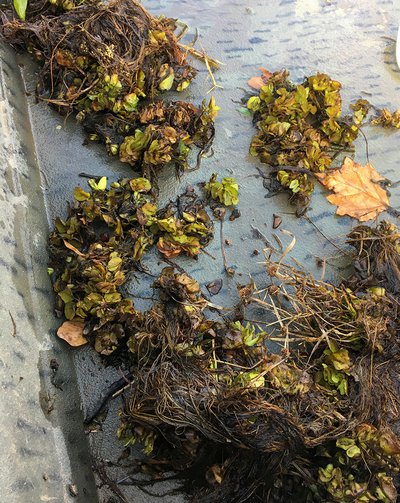Hunters urged to clean, drain and dry during duck season
ON 11-30-2022

Nov. 30, 2022
Randy Zellers
Assistant Chief of Communications
LITTLE ROCK – When the second segment of waterfowl season opens Dec. 10, hunters are hoping to have more water to spread out in search of mallards and memories. Before moving their boats to new areas, the Arkansas Game and Fish Commission strongly urges all hunters to closely inspect their boats, trailers and hunting equipment for vegetation and other invasive stowaways that could spread to new areas and destroy wildlife habitat.
The nomadic habits of ducks and duck hunters can make the perfect distribution system for unwanted aquatic invasive species, such as giant salvinia, water hyacinth and alligatorweed, which can reproduce quickly and choke out waterways to access as well as smother native vegetation attractive to ducks and other wildlife.
Matt Horton, aquatic nuisance species program coordinator for the AGFC, says some of Arkansas’s most recent discoveries of giant salvinia very well could have been transported by boats and hunting equipment used by duck hunters.
“We talk about aquatic invasive species throughout spring and summer because that’s when most boaters are on the water, but many hunters use boats, too,” Horton said. “They also tend to frequent shallower, hidden areas where these plants are more likely to become established and grow unnoticed.”

Most invasive aquatic plants spread by seeds and plant fragments. A single seed or tiny fragment of a plant can easily hitch a ride on hunting or fishing equipment and remain viable for several days out of the water. That’s why it is so important to inspect and clean your equipment before moving to new waters. Just a few minutes of preventative action can help protect our waters and your favorite hunting destination.
Hunters can help prevent the spread of aquatic nuisance species by following the three-step process of clean, drain and dry anytime they move to new water:
- Clean all equipment – Remove all plants and pieces of vegetation, seeds and mud off your waders, decoys, blind, truck, boat and trailer, and wash all equipment and gear with a high-pressure washer.
- Drain your boat – Drain all water by removing all drain plugs from your boat when you leave the boat ramp.
- Dry – Let all gear dry, preferably for five days, before visiting new waters. If there isn’t enough time to air dry between trips, use a towel to wipe dry remaining wet surfaces.
In addition to practicing clean, drain and dry, waterfowl hunters should pay particular attention to decoys, decoy anchors and swivels that can snag invasive aquatic plants.

According to Wildlife Forever, a 501(c)(3) nonprofit conservation agency dedicated to conservation education and preservation of habitat, invasive species like zebra mussels and water hyacinth cost Americans more than $137 billion each year. They outcompete native species, wiping out important fish and wildlife habitat. They can grow so densely that they can block access to prime hunting and fishing areas, destroy hunting and fishing equipment and wreak havoc on the internal workings of hydroelectric dams and water-pumping facilities.
Horton also reminds anyone using a boat that, according to the AGFC’s Code of Regulations, all drain plugs must be removed at the boat ramp when leaving a body of water and during transport, including those in live wells and bilge areas, where invasive species and pathogens may lurk.
Visit www.agfc.com/ans for more information about aquatic invasive species in Arkansas, how to report new sightings of possible invasive species and what hunters and other boaters can do to help protect our waters.
Recent News

Schoenrock chosen to lead AGFC
Apr. 21, 2025

AGFC Commissioner Meeting Notice
Apr. 21, 2025
Subscribe to Our Weekly Newsletter E-mails
Don’t miss another issue. Sign up now to receive the AGFC Wildlife Weekly Newsletter in your mailbox every Wednesday afternoon (Waterfowl Reports are published weekly during waterfowl season and periodically outside the season). Fishing Reports arrive on Thursdays. Fill in the following fields and hit submit. Thanks, and welcome!
